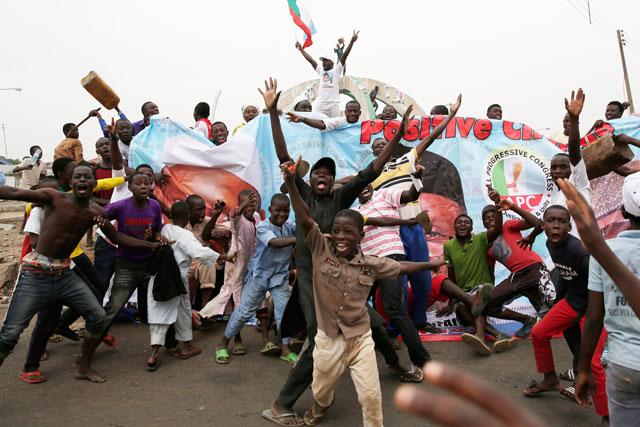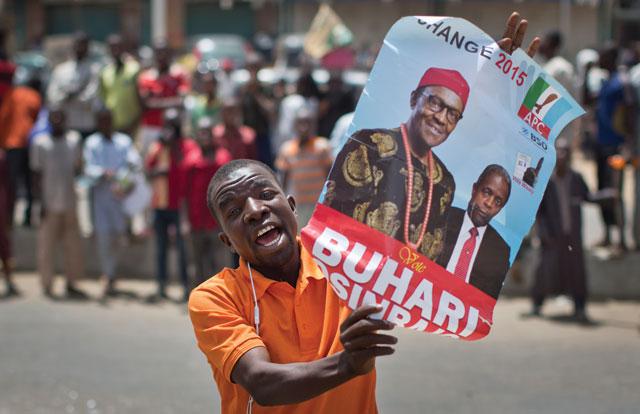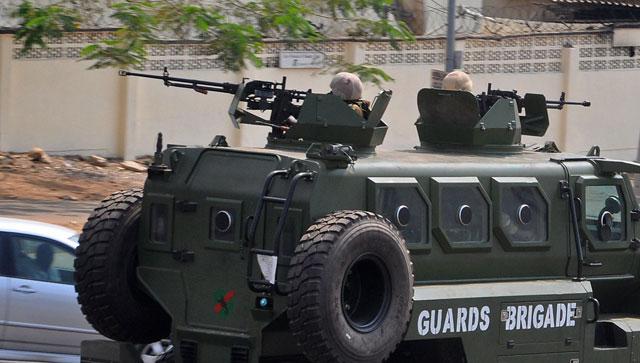You are here
Nigeria under fire over vote delay
By AFP - Feb 08,2015 - Last updated at Feb 08,2015

Abuja — Nigerian authorities came under fire on Sunday over the decision to postpone national elections in the face of relentless Boko Haram violence, with the opposition branding the move a "major setback for democracy".
Some observers charged that the political woes of President Goodluck Jonathan — facing an increasingly strong election challenge from ex-military ruler Muhammadu Buhari — were the real reason for the delay.
Election body chairman, Attahiru Jega, announced late Saturday that the presidential and parliamentary polls would be postponed from February 14 to March 28, while gubernatorial and state assembly elections would be held on April 11.
National security adviser Sambo Dasuki had written to Jega saying security could not be guaranteed on February 14 because all available military resources were committed to an intensified operation against the Islamists in the northeast.
But the Buhari's All Progressives Congress (APC) called the postponement "highly provocative" and "a major setback for democracy", while nevertheless appealing for calm.
The United States said it was "deeply disappointed" by the delay, with Secretary of State John Kerry warning the government against using "security concerns as a pretext for impeding the democratic process".
Jonathan's ruling Peoples Democratic Party (PDP) was facing its first serious electoral challenge since the end of military rule in 1999, with growing support for the APC.
Buhari, who has positioned himself as Nigeria's top anti-corruption crusader, was thought to have locked up a majority in the mainly Muslim north, his home region, while building support among southerners fed up with graft.
'All necessary measures'
There were widespread fears about security for the February 14 vote, with Boko Haram intensifying its bloody six-year insurgency in Nigeria and spreading its campaign of terror into neighbouring countries.
UN Secretary General Ban Ki-moon urged electoral authorities "to take all necessary measures... to exercise their right to vote in a timely manner", including the rapid distribution of voter cards.
"This is imperative for ensuring a credible, free and transparent election," his spokesman said in a statement.
Dasuki had first raised the prospect of a postponement last month when he noted difficulties in distributing voter identity cards.
Jega had said on Thursday that the Independent National Electoral Commission (INEC) was ready for February 14 and that 66.5 per cent of Nigeria's 68.8 million registered voters had collected their polling cards.
But on Saturday Jega said "other variables" made a delay necessary, explaining that the military "may not be able to provide the traditional support" they render during elections.
In Boko Haram's northeast stronghold, hundreds of thousands of people displaced by the fighting were at risk of being disenfranchised.
'Destroy democracy'
Election day security in the past has been conducted by police and a civil defence body rather than soldiers.
Jibrin Ibrahim, a political analyst with the Centre for Democracy and Development, said Nigeria's security agencies had forced Jega into the delay on "frivolous" grounds.
"They say they need six weeks to defeat Boko Haram. Boko Haram has been growing for six years... If in six weeks Boko Haram has not been defeated, they could call for another delay and ultimately destroy Nigerian democracy," he added.
But the ruling PDP said it welcomed the postponement because "it was in the best interest of democracy".
Analysts say the PDP could use the extra time to rebuild lost support, noting that its superior financial resources put the ruling party in a far better position to run an extended campaign.
But a coalition of more than 20 civil society groups said the military's inability to deploy for the election amounted to "an abdication of its constitutional duties".
The postponement "appeared contrived to truncate the democratic process in Nigeria," the coalition said.
Boko Haram fighters — who already control swathes of northeastern Nigeria — waged a fresh attack in neighbouring Niger on Sunday, triggering several hours of fighting with government troops.
Chad, Cameroon and Niger are working with Nigeria against Boko Haram, claiming several successes in recent weeks including wresting several key towns from Islamist control.
Experts say further gains are possible over the next six weeks but note that Boko Haram has proved resilient throughout the conflict.
"To dislodge Boko Haram from all these areas in a period of six weeks would be an unprecedented feat," said Ryan Cummings, chief Africa analyst at Red24 risk consultants.
Related Articles
Nigerian election winner Muhammadu Buhari congratulated outgoing President Goodluck Jonathan for peacefully relinquishing power on Wednesday, a day after becoming the first politician in Nigeria's history to remove a sitting leader at the ballot box.
Three decades after seizing power in a military coup, Muhammadu Buhari became the first Nigerian to oust a president through the ballot box, putting him in charge of Africa's biggest economy and one of its most turbulent democracies.
Nigeria on Monday vowed to crush Boko Haram within six weeks as its leader warned a new regional fighting force "will not achieve anything" and the rebels launched fresh cross-border attacks.



















